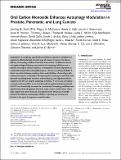Oral Carbon Monoxide Enhances Autophagy Modulation in Prostate, Pancreatic, and Lung Cancers
Author(s)
Bi, Jianling; Witt, Emily; McGovern, Megan K.; Cafi, Arielle B.; Rosenstock, Lauren L.; Pearson, Anna B.; Brown, Timothy J.; Karasic, Thomas B.; Absler, Lucas C.; Machkanti, Srija; Boyce, Hannah; Gallo, David; Becker, Sarah L.; Ishida, Keiko; Jenkins, Joshua; Hayward, Alison; Scheiflinger, Alexandra; Bodeker, Kellie L.; Kumar, Ritesh; Shaw, Scott K.; Jabbour, Salma K.; Lira, Vitor A.; Henry, Michael D.; Tift, Michael S.; Otterbein, Leo E.; Traverso, Giovanni; Byrne, James D.; ... Show more Show less
DownloadAccepted version (3.392Mb)
Publisher with Creative Commons License
Publisher with Creative Commons License
Creative Commons Attribution
Terms of use
Metadata
Show full item recordAbstract
Modulation of autophagy, specifically its inhibition, stands to transform the capacity to effectively treat a broad range of cancers. However, the clinical efficacy of autophagy inhibitors has been inconsistent. To delineate clinical and epidemiological features associated with autophagy inhibition and a positive oncological clinical response, a retrospective analysis of patients is conducted treated with hydroxychloroquine, a known autophagy inhibitor. A direct correlation between smoking status and inhibition of autophagy with hydroxychloroquine is identified. Recognizing that smoking is associated with elevated circulating levels of carbon monoxide (CO), it is hypothesized that supplemental CO can amplify autophagy inhibition. A novel, gas‐entrapping material containing CO in a pre‐clinical model is applied and demonstrated that CO can dramatically increase the cytotoxicity of autophagy inhibitors and significantly inhibit the growth of tumors when used in combination. These data support the notion that safe, therapeutic levels of CO can markedly enhance the efficacy of autophagy inhibitors, opening a promising new frontier in the quest to improve cancer therapies.
Date issued
2023-12-12Department
Massachusetts Institute of Technology. Department of Chemical Engineering; Koch Institute for Integrative Cancer Research at MIT; Massachusetts Institute of Technology. Department of Mechanical Engineering; Massachusetts Institute of Technology. Division of Comparative MedicineJournal
Advanced Science
Publisher
Wiley
Citation
J. Bi, E. Witt, M. K. McGovern, A. B. Cafi, L. L. Rosenstock, A. B. Pearson, T. J. Brown, T. B. Karasic, L. C. Absler, S. Machkanti, H. Boyce, D. Gallo, S. L. Becker, K. Ishida, J. Jenkins, A. Hayward, A. Scheiflinger, K. L. Bodeker, R. Kumar, S. K. Shaw, S. K. Jabbour, V. A. Lira, M. D. Henry, M. S. Tift, L. E. Otterbein, G. Traverso, J. D. Byrne, Oral Carbon Monoxide Enhances Autophagy Modulation in Prostate, Pancreatic, and Lung Cancers. Adv. Sci. 2024, 11, 2308346.
Version: Final published version
ISSN
2198-3844
2198-3844